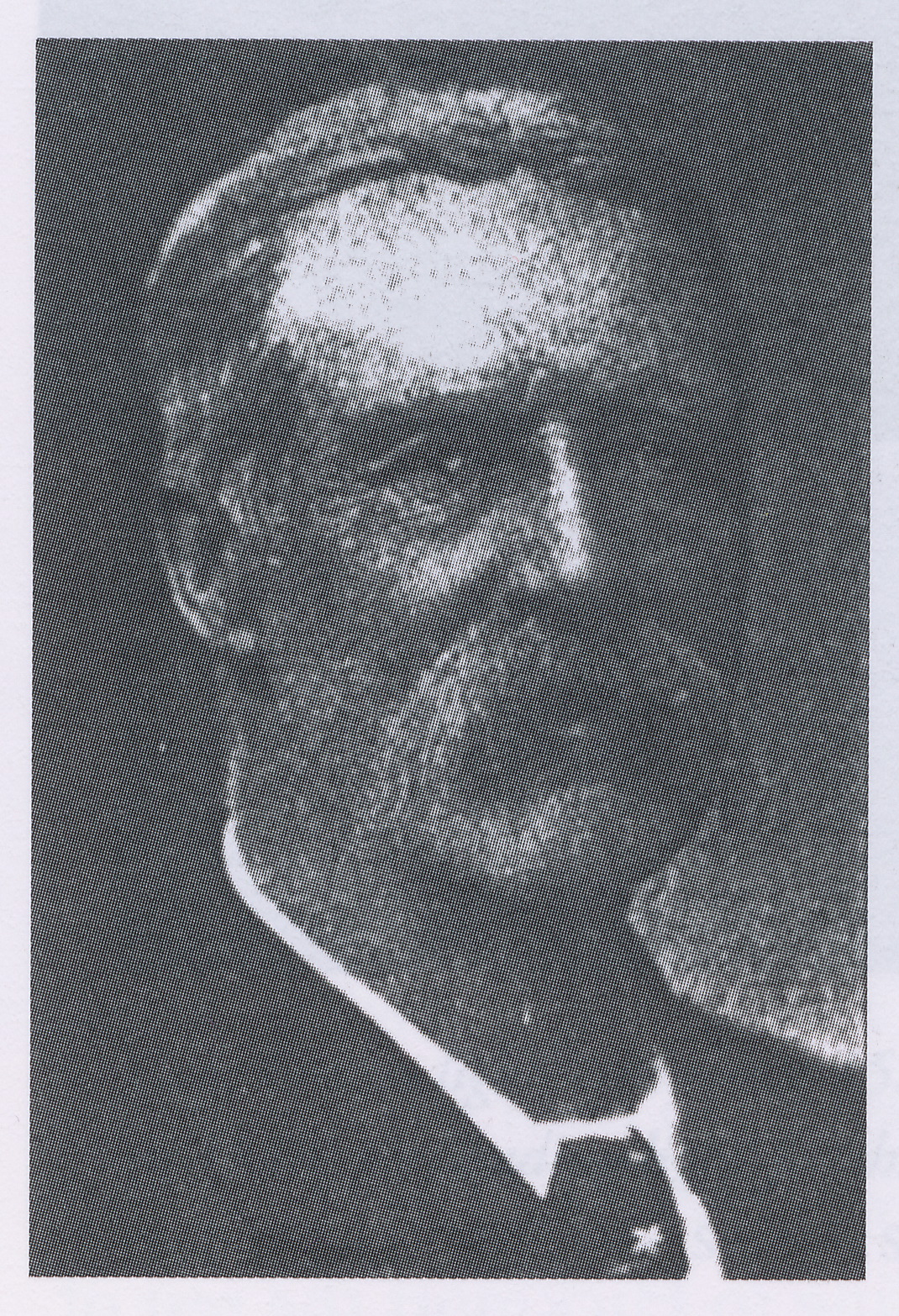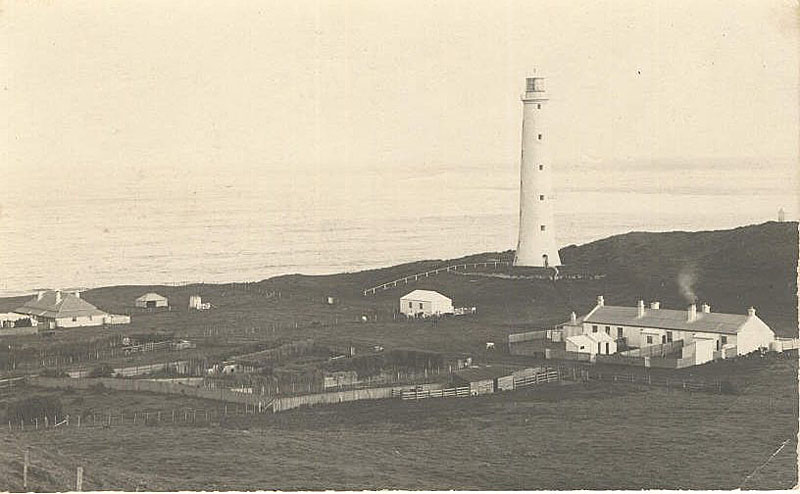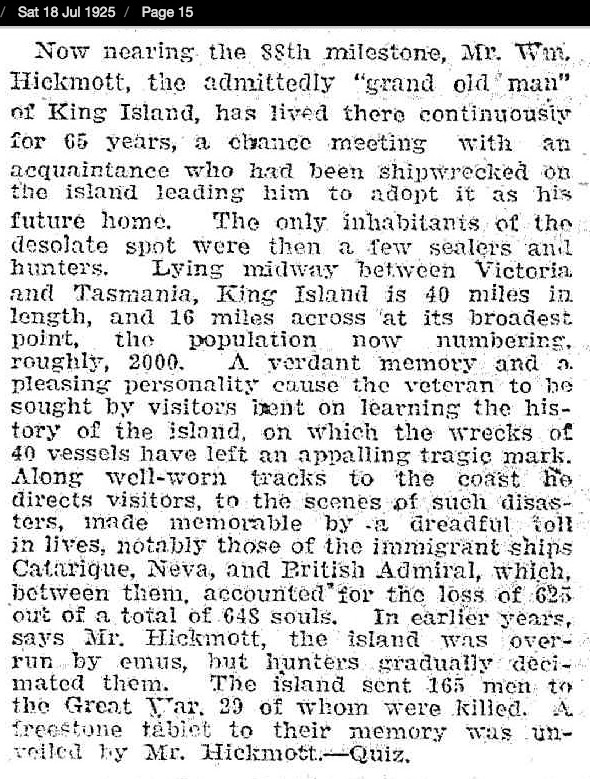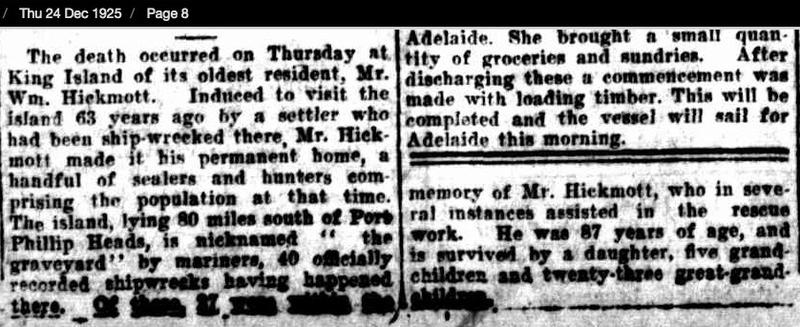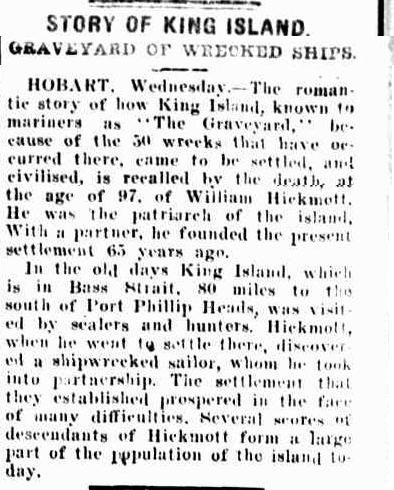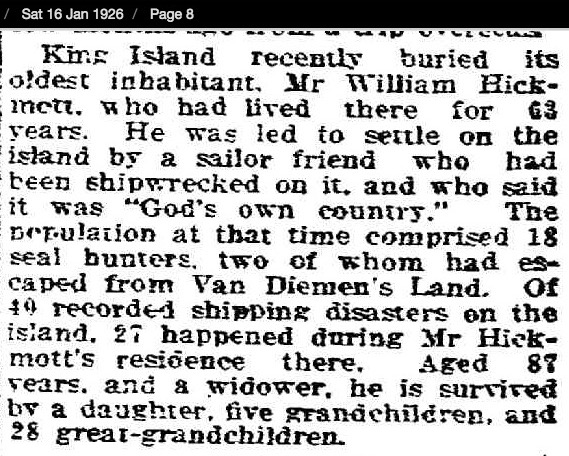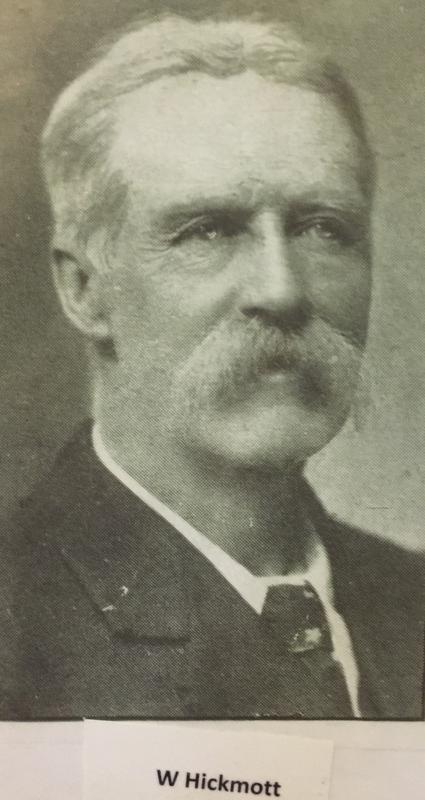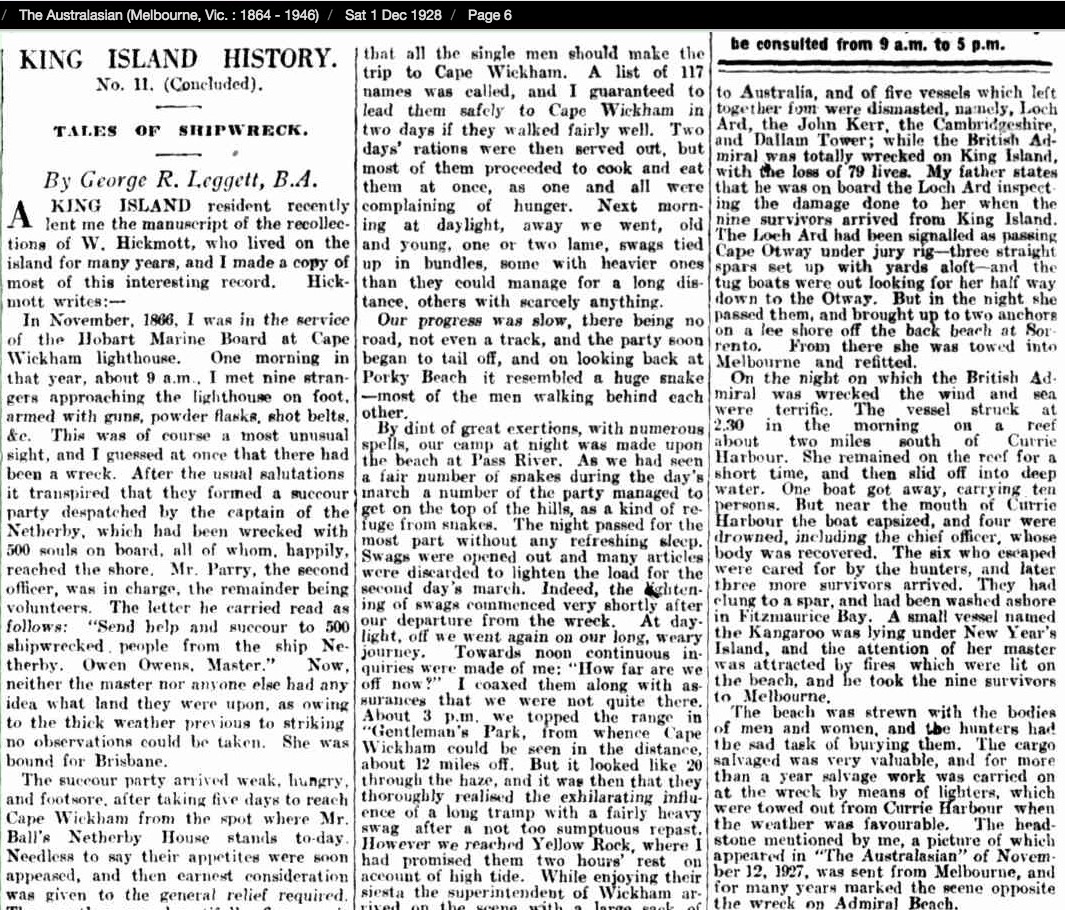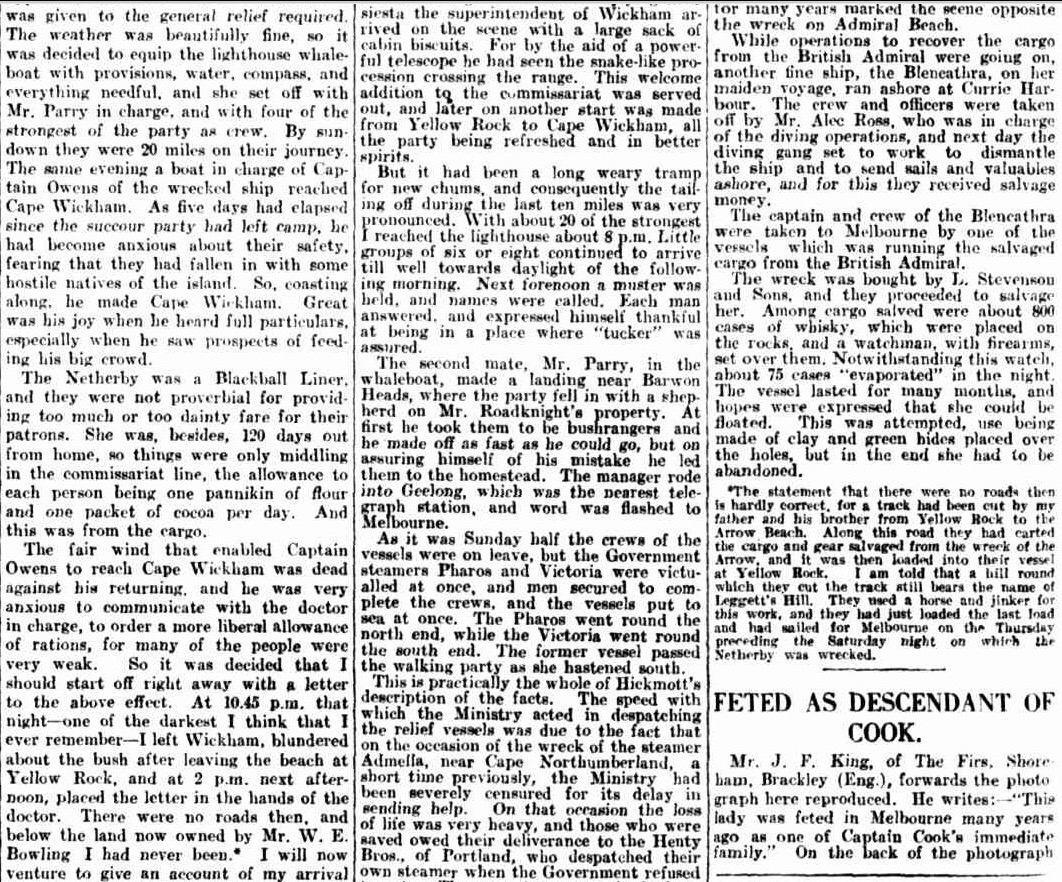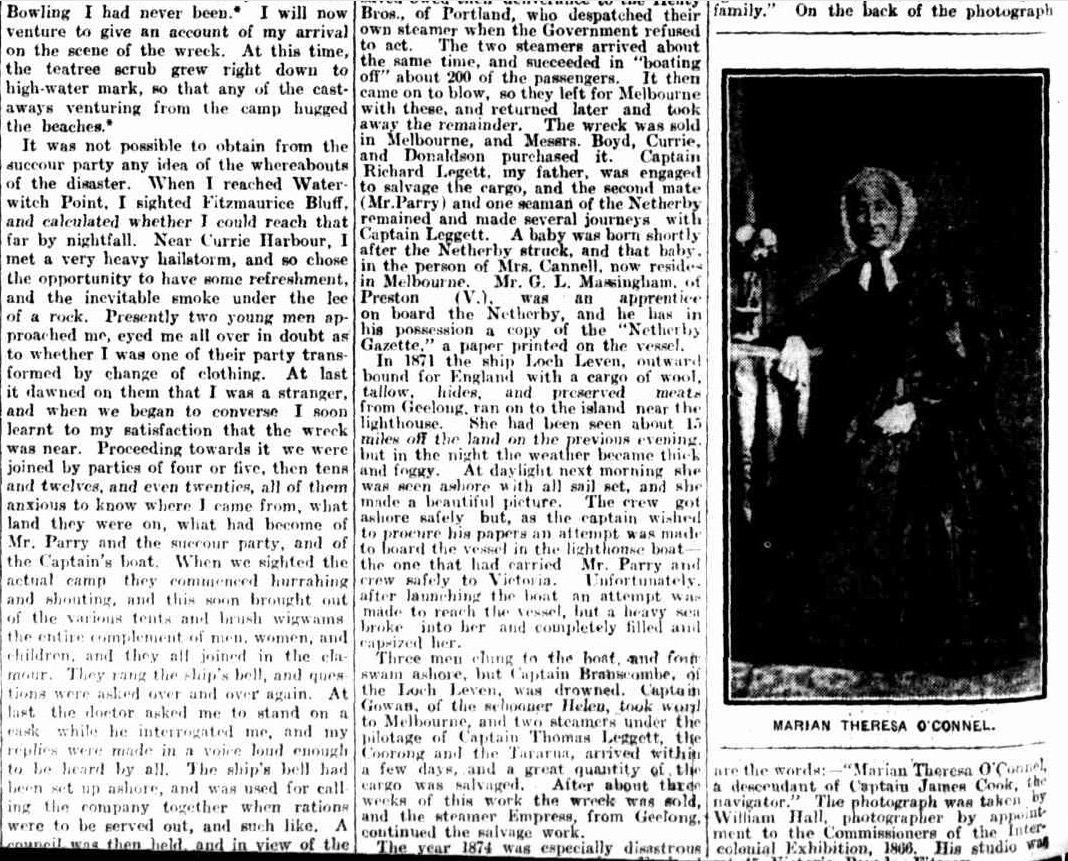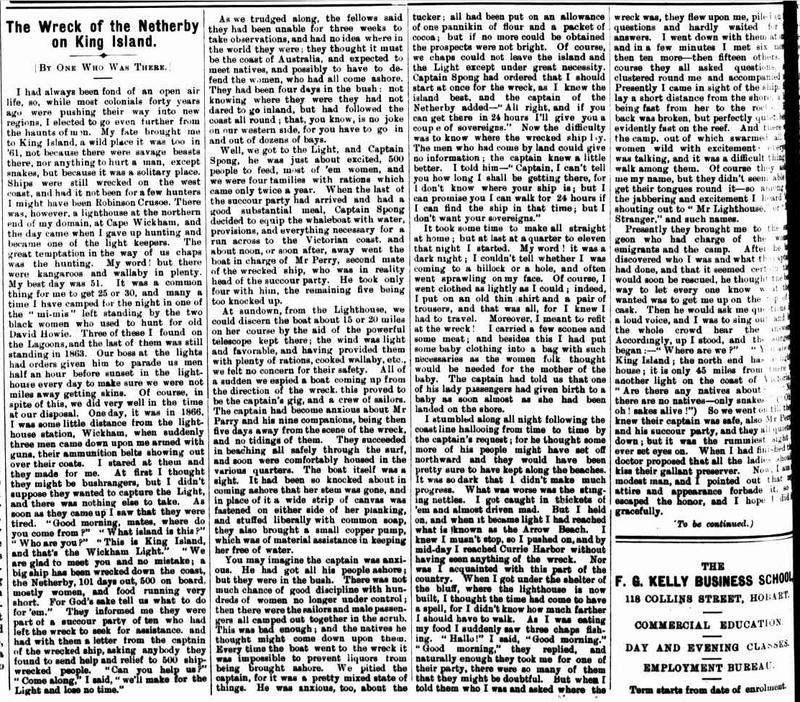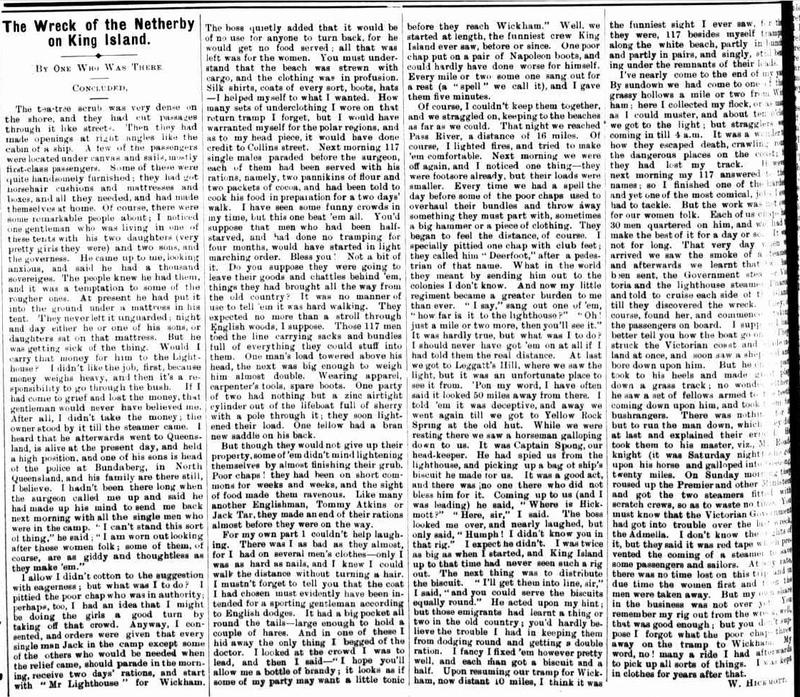The Lighthouse Keepers Account.
The recollections of Mr William Hickmott.
Critic (Hobart, Tas.), Saturday 30 May 1908, The Wreck of the "Netherby" on King Island (As related by Hickmott).
I have always been fond of an open-air life so while most colonials forty years ago were pushing their way into regions I elected to go even further from the haunts-of men. My fate brought me to King Island, a wild place it was too in 1861, not because there were savage beasts there nor anything to hurt a man except snakes, but because it was a solitary place. Ships were still being wrecked on the west coast and had it not been for a few hunters I might have been a Robinson Crusoe. There was, however, a lighthouse at the northern end of my domain at Cape Wickham and the day came when I gave up hunting and became one of the light keepers. The great temptation in the way of us chaps was the hunting. My word but there were kangaroos and wallabies in plenty. My best day’s taking was fifty-one. It was a common thing for me to get twenty-five or thirty and many a time I have camped for the night in one of the gunyas left standing by the two black women who used to hunt for old David Howie. Three of these I found at the lagoons, and the last of them was still standing in 1863.
Well our boss at the Lighthouse had orders given him to parade us men half an hour before sunset in the lighthouse grounds every day to make sure we were not miles away getting skins. Of course in spite of this we did very well in the time at our disposal. One day, it was in 1866, I was some little distance from the shore when suddenly three men came down carrying guns under their arm and ammunition belts showing out under their coats. They said they wanted to send for help and relief to 500 shipwrecked people, ‘Can you help us?’. ‘Come along’, I said, ‘we’ll make for the light and lose no time’. As we trudged along the fellows said they had been unable for three weeks to take observations and had no idea where in the world they were. They thought it must be the coast of Australia and expected to meet with natives and possibly have to defend the women who had all come ashore. They had been four days in the bush. Not knowing where they were they had not dared to go inland but had followed the coast all round. That you know is no joke on our western side, for you have to go in and out of dozens of bays. Well we got to the light and Captain Spong he was just about excited - five hundred people to be fed most of ‘em women, and we were four families with rations which cane only twice a year. The rest of the succour party came and had a good substantial meal.
Captain Spong decided to equip the whale boat with water, provisions and everything necessary for a run across to the Victorian coast. About noon or soon after away went the boat in charge of Mr. Parry second mate of the wrecked ship, who was in reality head of the succour party. He took only four with him, the remaining five being too knocked up. At sundown from the lighthouse we could discern the boat about fifteen or twenty miles on her course by aid of a powerful telescope kept there. The wind was light and favourable and having provided her plentifully with rations, cooked wallaby etc., gave us no concern for their safety.
All of a sudden we espied something from the direction of the wreck. It was Captain Owen, commander of the "Netherby" and a few sailors accompanying him. Captain Owen had become anxious regarding the ship’s position.
While the second mate, Mr. Parry, was on his way from the lighthouse to Melbourne to report the wreck and arrange rescue, Captain Owen left the shipwrecked people in the charge of the ship’s doctor, and with a few men struck out for the lighthouse where he would gain information regarding his whereabouts. He had been two days ashore with his unfortunate people and were "still in the bush". There was not much chance of good discipline with hundreds of women no longer under control. Then there were the sailors and male passengers all camped out together in the scrub. This was bad enough, and the natives, he thought, might come down upon them. Every time the boat went to the wreck it was impossible to prevent liquors from being brought ashore. We pitied the Captain for it was a pretty mixed state of things. He was anxious too about the tucker. All had been put on an allowance of one panican of flour and one packet of cocoa, but if no more could be obtained the prospects were not bright.
Of course we chaps could not leave the island and the light except under great necessity. Captain Spong had ordered that I should start at once for the wreck as I knew the Island best, and the Captain of the "Netherby" added "all right, and if you can get there in twenty-four hours I’ll give you a couple of sovereigns". Now the difficulty was to know where the wrecked ship lay. The men who had come by land could give no information and Captain Owen knew but little better. I said to him, "Captain I can’t tell you how long I shall be getting there for I don’t know where your ship is, but I can promise you I can walk for twenty-four hours if I can find the ship in that time, but I don’t want your sovereigns".
It took some time to make all straight at home but at last at a quarter to eleven that night I started. My word it was a dark night. I couldn’t tell whether I was coming to a hillock or a hole, and often went sprawling on my face. Of course I went clothed as lightly as I could and put on an old thin shirt and a pair of trousers and that was all. I knew I had to travel however and meant to refit at the wreck. I took four scones and some meat, and also some food for mothers with babies. Mosquitoes almost drove me mad, but I held on and when it became light I found I had reached what is known as the Arrow Beach. I knew I mustn’t stop so I pushed on, and by midday I reached Currie harbour without having seen anything of the wreck; nor was I acquainted with this part of the country. When I got under the shelter of the bluff where the Lighthouse is now built, I thought the time had come to have a spell for I did not know how much further I should have to walk.
As I was eating my food I suddenly saw three chaps fishing. "Hullo", I said, "Good Morning". "Good Morning", they replied and naturally enough they took me for one of their party. There were so many of them that they might be doubtful; but when I told them who I was and asked where the wreck was, they flew upon me, piled on the questions and hardly waited for the answers. I went down with them at once and in a few minutes I met six more, then ten more and then fifty others. Of course they all asked questions and clustered round me and accompanied me. Presently I came in sight of the ship. She lay a short distance from the shore, a line being fast from her to a rock. Her back was broken, but perfectly quiet being evidently fast on the reef, and there was the camp out of which came all the women wild with excitement; everyone was talking and it was a difficult thing to walk among them. Of course they asked me my name, but they did not seem able to get their tongues round it, so among all the gathering and excitement I heard ‘em shouting out to Mr. Lighthouse or Mr. Stranger. Presently they brought me to the surgeon who had charge of the immigrants and the camp. After he had discovered who I was and what the Captain had done and that it seemed certain that they would soon be able to take leave of the island, thought the best way to let everyone know was to stand me on a cask. He then asked questions in a loud voice, I shouting back to let the whole crowd hear my answers. It -was the rummiest sight I ever set eyes upon. When we had finished the doctor proposed that all the ladies should kiss their gallant preserver. Now I am a modest man and pointed out that my attire and appearance forbade it, so I escaped the honour, and I hope I did it gracefully.
The tea-tree scrub was very dense on the shore and they had out passages through it like streets. Then they had made square openings like the cabins in the ship. A few of the passengers were located under canvas and sails, mostly first class passengers. Some of them were most handsomely furnished; they had got horse cushions and mattresses and boxes, and all they needed and had made themselves at home. There were some very remarkable people about. I noticed one gentleman who was living in one of these tents with his daughters (very pretty girls they were) and two sons and a governess. He came up to me looking anxious and said he had a thousand sovereigns. The people knew he had this and it was a temptation to some of the rougher ones. At present he had put it into the ground under the mattress in his tent. They never left it unguarded night and day; either he, or one of his sons or one of his daughters sat on that mattress. But he was getting sick of the thing. Would I carry that money for him to the Lighthouse? I didn’t like the job, first because money weighs heavy and it’s a responsibility to go through the bush with so much treasure. If had come to grief and lost the money, that gentleman would never have believed me. After all I didn’t take the money. The owner stood by it till the steamer came. I heard that he afterwards went to Queensland, is alive at this present day, and holds a high position and one of his sons is head of the Police at Bundaberg in north Queensland, and his family are there still I believe. The wreck was in July 1866).
I hadn’t been long there before the surgeon called me up and said he had made up his mind to start me back to the lighthouse taking rations that were made in the camp. "I can’t", he said, "leave this woman I am looking after without help, nor the man Jack, and some of the sailors must stay who will be needed when relief comes. Some sailors and the younger male passengers unmarried will parade in the morning, receive two days’ rations, and start with Mr "Lighthouse" for Wickham". The boss quietly added that it would be of no use for anyone to turn back for he would get no food served; all that was left was for the women.
You must understand that the beach was strewn with cargo and the clothing was in profusion. Silk shirts and coats of every sort, boots, hats, I helped myself to what I wanted. How many sets of underclothing I wore on that return tramp I forget, but I would have warranted for the polar regions, and as for my headpiece, t’would have done credit to Collins Street. Next morning-one hundred and seventeen single males paraded before the surgeon, -each of them had been served with his rations namely two pannicans of flour and two packets of cocoa, and had been told to cook his food in preparation for a two days walk.
I have seen some funny crowds in my time, but this one beats them all. You’d suppose that men who had been half starved and had done no tramping for some four months would have started in light marching order. Bless you! Not a bit of it. Do you suppose they were going to leave their goods and chattels behind ‘em, things they had brought all the way from the old country? It was no manner of use to tell ‘em it was hard walking. They expected no more than a stroll through English woods. I suppose those one hundred and seventeen men toed the line carrying sacks and bundlefuls of everything they could stuff into them. One man’s load towered above his head; the next was big enough to weigh him almost double. Wearing apparel, carpenters tools, spare boots. One party of two had nothing but a zinc cylinder out of the life boat full of sherry with a Pole through it; they soon lightened their load. One fellow had a brand new saddle on his back. But though they would not give up their property some of them did not mind lightening themselves by almost finishing the liquor. They started on port common for weak minded and inviled men. They reckoned I was as hard as nails and know I could walk the distance without turning a hair. I mustn’t forget to tell you that the coat I had chosen must evidently have been intended for a sporting gentleman according to English dodges. I had a big pocket all round the tails, large enough to hold a couple of hares. In one of these I hid away the only thing I begged of the Doctor. I looked at the crowd I had to lead and then I said "Sir, I hope you will allow me a bottle of brandy, it looks as if some of the party may want a little tonic before they reach Wickham". Well we started at length, the funniest crew King Island ever saw before or since. One poor chap put on a new pair of Napoleon boots and could have hardly done worse for himself. Every mile or two someone sang out or a rest (a spell we call it) and I gave then, five minutes. Of course I couldn’t keep ‘em together, and we struggled on keeping to the beaches as far as we could. That night we reached Bass River, a distance of sixteen miles. Of course I lighted fires and tried to make them comfortable. Next morning we were off again and I noticed one thing, that they were foot sore already and their loads were smaller. Every time we had a spell the day before some of the poor chaps used to overhaul their bundles and throw away something they must part with, sometimes a big hammer or a piece of clothing. They began to feel the distance of course. I speedily pitied one chap with club feet; they called him ‘‘Deerfoot" after a Pedestrian of that name. What in the world they meant by sending him out to the colonies I don’t know.
Now my regiment became a greater burden to me than ever. "I say", sang out one of them, "How far is it to the lighthouse?" "Oh! Just a mile or two and you’ll see it". It was hardly true, but what was I to do? The crowd hobbled along expectantly hoping every hour to come in sight of the light. But instead of the lighthouse we saw a few men coming toward us. It was the Captain who had started out with a small band of men to meet the company of unmarried men which I was leading. "Hullo", he said, "Where is Hickmott?" "Here Sir", I said. The boss looked me over and nearly laughed but only said "Humph! I didn’t know you in that rig." I expect he didn’t. I was twice as big as when I started, and King Island up to that time had never seen such a rig out. The next thing was to distribute the biscuits. "I’ll get them into line, Sir", I said, "and you can serve the biscuits equally all round." He acted on my suggestion, but those emigrants had learnt a thing or two in the Old Country. You’d hardly believe the trouble I had in keeping them from dodging round and getting a double ration. I fancy I fixed them pretty well and each man got a biscuit and a half and we resumed out tramp for Wickham, now distant ten miles. I think it was the funniest sight I ever saw, for there were one hundred and seventeen besides myself tramping along the white beach, partly in bunches and partly in pairs and singly, still bending under the remnants of their loads. I’ve nearly come to the end of my yarn. By sundown we had come to one of those grassy hollows a mile or two from Wickham. Here I collected my flock, or as, many as I could muster, and about ten o’clock we got to the light, but stragglers were coming in till four a.m. It was a wonder how they escaped death crawling round the dangerous places on the coast for they had lost my tracts. However, next morning my one hundred and seventeen answered to their names, and so I finished one of the hardest and yet one of the most comical jobs I ever had to tackle.
However the work was not over for our leading folk. Each-of us chaps had fifty men chartered on him and had to make the best of it for a day or two. It was not long, however, after we arrived that we saw the wake of a steamer. It proved to be H.M.S. Victoria on her way to the wreck. It was Wednesday 25th July, 1866. Mr. Parry with two passengers in the whale boat crossed the straits and made the Australian coast near Mr. Roadknight’s station at 6 p.m. on Friday, and a horse being provided, Mr. Parry reached Queenscliffe on Saturday evening and communicated through the electric telegraph with the harbour master at Williamstown who was the Government representative there. Mr. Parry mounted his horse again and hurried to Geelong, twenty miles distant. On Sunday morning they roused the Premier and other ministers who got the two steamers, H.M.S. Victoria and Pharis, fitted with scratch crews so as to waste no time. You must know that the Victorian Government had got into trouble over the loss of "Admelta". Such sudden reports have to be met with expedition, but with care. I don’t know the rights of it, but they say it is quite true that it was delay which prevented the coming of a steamer in time to save a number of shipwrecked sailors.
At any rate, there was no time lost in anchoring the rescuing vessels and lowering their boats, and in time, the women first and then the men, were taken aboard. But the finish of my business was not over yet. You remember the risk I had on the way to the wreck, well that was good enough; but you don’t suppose I forgo what those poor chaps threw away on the tramp to Wickham. My word, how many a ride I had afterwards to pick up all sorts of things. I was kept in clothes for years after that.
Mr. W. Hickmott.
First Hand Accounts From Those Who Were There
Above: Cape Wickham Lighthouse
Left: Mr William Hickmott
In 1928 George R Leggett, the son of Captain Richard Leggett who was engaged to salvage the Netherby cargo, wrote an article featuring Mr Hickmott's account of the Netherby and other wrecks on King Island. Click on the PDF to read it.
The World's News
Richmond River Express 30 Dec 1925
The Burnie Advocate
The Weekly Times
Hobart Critic: 23 May 1908 Part 1 of Hickmott's account.
Hobart Critic: 30 May 1908. Second chapter of Hickmott's account
